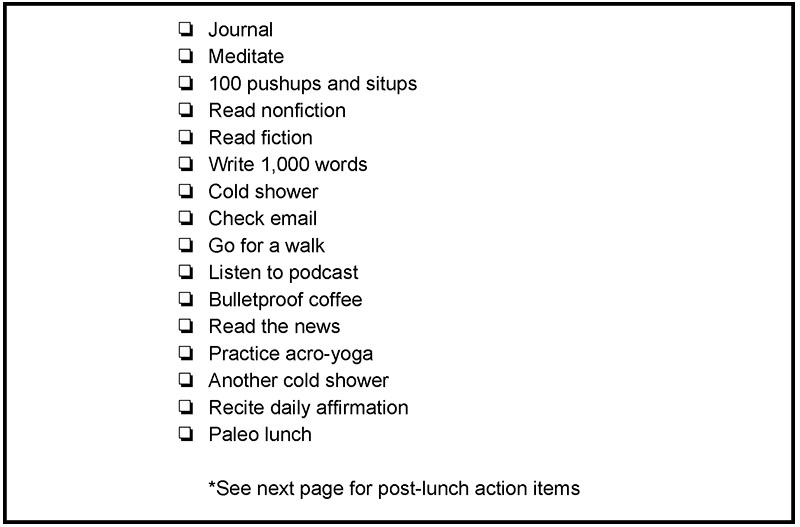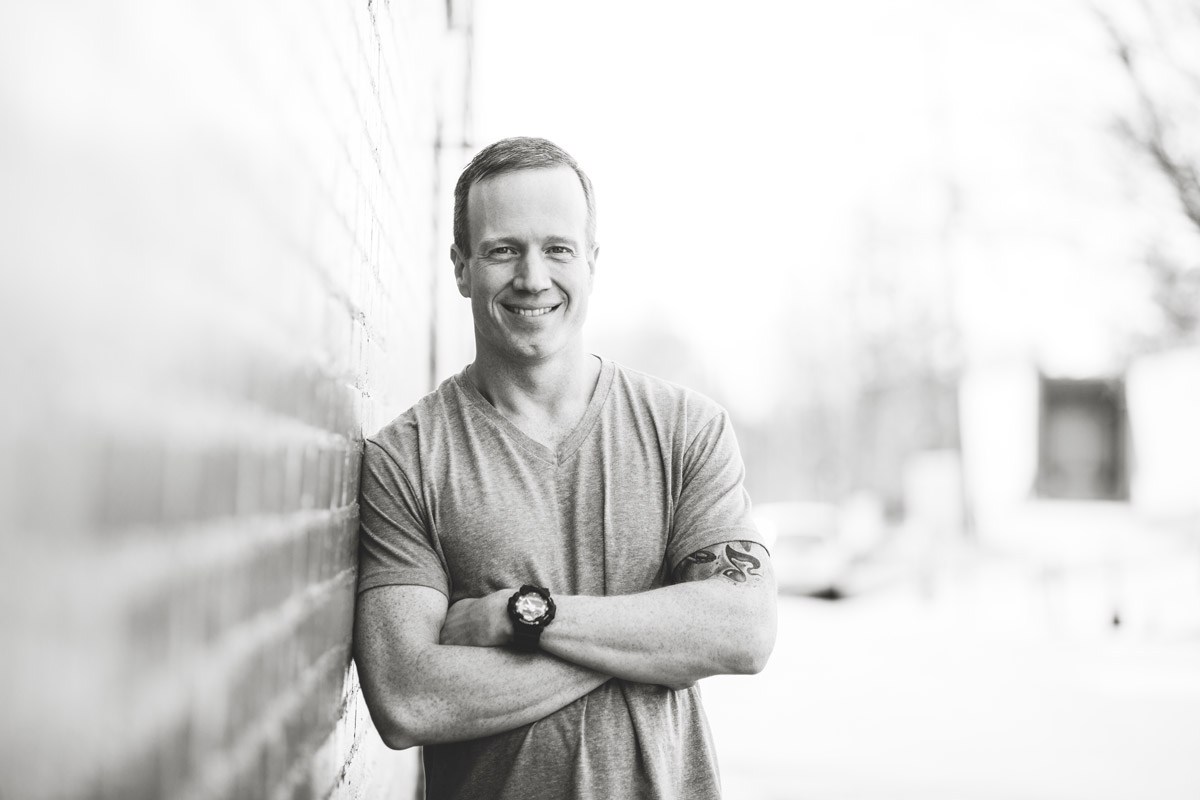I managed to not die yesterday.
That shouldn’t be a huge shock. I’m healthy-ish for 37. I eat well enough, have never had a cavity, and exercise a few times a week. Most importantly, I’m one of the best drivers on the road — just ask my wife. And I know I can’t control anything else, so I’m doing my best to increase my odds of spending a few more decades on this planet.
But if you read much nonfiction, you probably feel like you’re way behind in the self-improvement arms race. It seems like here’s a “hack” for everything. Our “morning routine” should include 17 different “best practices” before we even brush our teeth. What do we do with all the free time we gain after “optimizing” everything we do? Fill it with more “rituals,” of course.
There are way too many quotes in that last paragraph. I had no choice — there are too many “buzzwords.”
If we took only half the advice from all of the books and blogs, our day would look something like this:

I have anxiety from just typing that. How am I supposed to do all these things and still get 8 hours of sleep?
What I really want is LESS. Less routine. Less hacking and optimizing and filling every minute of my calendar. I want more margin in my life. (Side question: Does this make me old?)
I know I’m exaggerating. No one does everything on this list every single day. But, after reading hundreds of books and thousands of articles about “top performers,” it sure seems that way. Everything starts to run together.
What I don’t read as often is advice telling us to slow down. To stop cramming so much into our schedule and leave ourselves a little breathing room. Instead, we’re supposed to realize that life is short and live each day like it’s our last.
That’s exhausting. When my schedule is booked solid with more than I can ever finish, the day flies by. But when I don’t have something planned for every hour, the day feels much slower. And if life is short, I want it to go by as slow as possible.
Addition Through Subtraction
One thing I do is focus on the practices that I enjoy, then “subtract” the rest.
There was a time when I tried to do way too much. I was determined that I would journal, read, write, and work on a side business every day — before starting my actual job. During lunch, I would spend time learning something new through an online course. After work, I would go to the gym, then spend another 30 minutes stretching afterward. At night I would work more on a side business and plan for the next morning. And somewhere between all of this, I would spend time with family and friends.
I was setting myself up for failure. Because I was so rigid with what I wanted to accomplish in a day, I was disappointed when I didn’t get to everything. Every minute of my day was committed to something, and that left me with no margin.
If some new or exciting opportunity popped up, I didn’t have the time to consider it. My brain was so exhausted by the afternoon that I couldn’t focus. So I started deleting things.
I had three absolutes: spend quality time with my family, be healthy, and don’t get fired. (I never imagined I would fire myself.) Beyond that, I got the most joy from reading and writing. Then I cut everything else out — except for bulletproof coffee, because it’s delicious.
Now I have a little more breathing room. When I find free time in my schedule, I fill it in however I choose. If I don’t feel like doing anything else, then that’s exactly what I do. And it feels amazing.
Just Say No
Having margin in our lives helps maintain our sanity. It’s easy to overcommit ourselves and give away our most precious resource: time.
If we say “yes” to every new routine and self-improvement practice we hear about, we get overwhelmed. And if we accept every invitation to go there or do that, we lose control of our schedules.
But there’s only so much of us to go around. Sometimes we have to just say “no.” (See? Something good did come out of the ‘80s.)
Time is a nonrenewable resource. If we give it all away, we leave no room for flexibility. But it feels great to have room to say “yes” to something spontaneous. And I like being able to work on fun things of my choosing. Most of the things we do should excite us — or at least not give us anxiety. Derek Sivers says this way better than I can: this will take you 30 seconds to read.
If we aren’t excited about something, then we can just say “no.” Or we could say, “maybe,” but people have something against non-commitment. That’s a topic for another day.
It’s amazing that our lifespans aren’t decreasing. All the pressure and anxiety that comes with busy routines and full schedules is overwhelming. And I know we have commitments to family and jobs. I’m not saying I want to go “scorched earth” and blow everything up. But I do want to be protective of how I spend the few decades I (hopefully) have left.
When I have more margin in my life, I’m more focused and productive with the things I work on. I have less routines, fewer commitments, and I’m less distracted. I have free time to start new projects or try new things.
But sometimes I just want to sit and do absolutely nothing.
